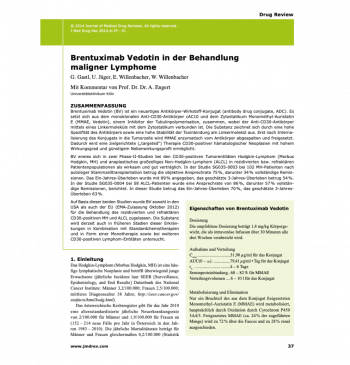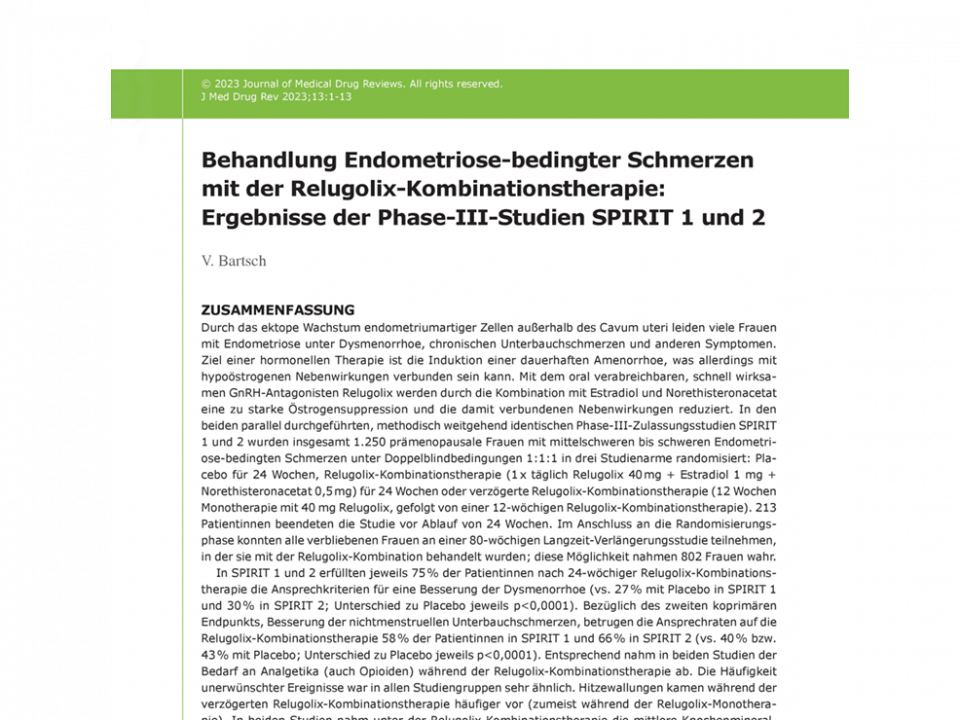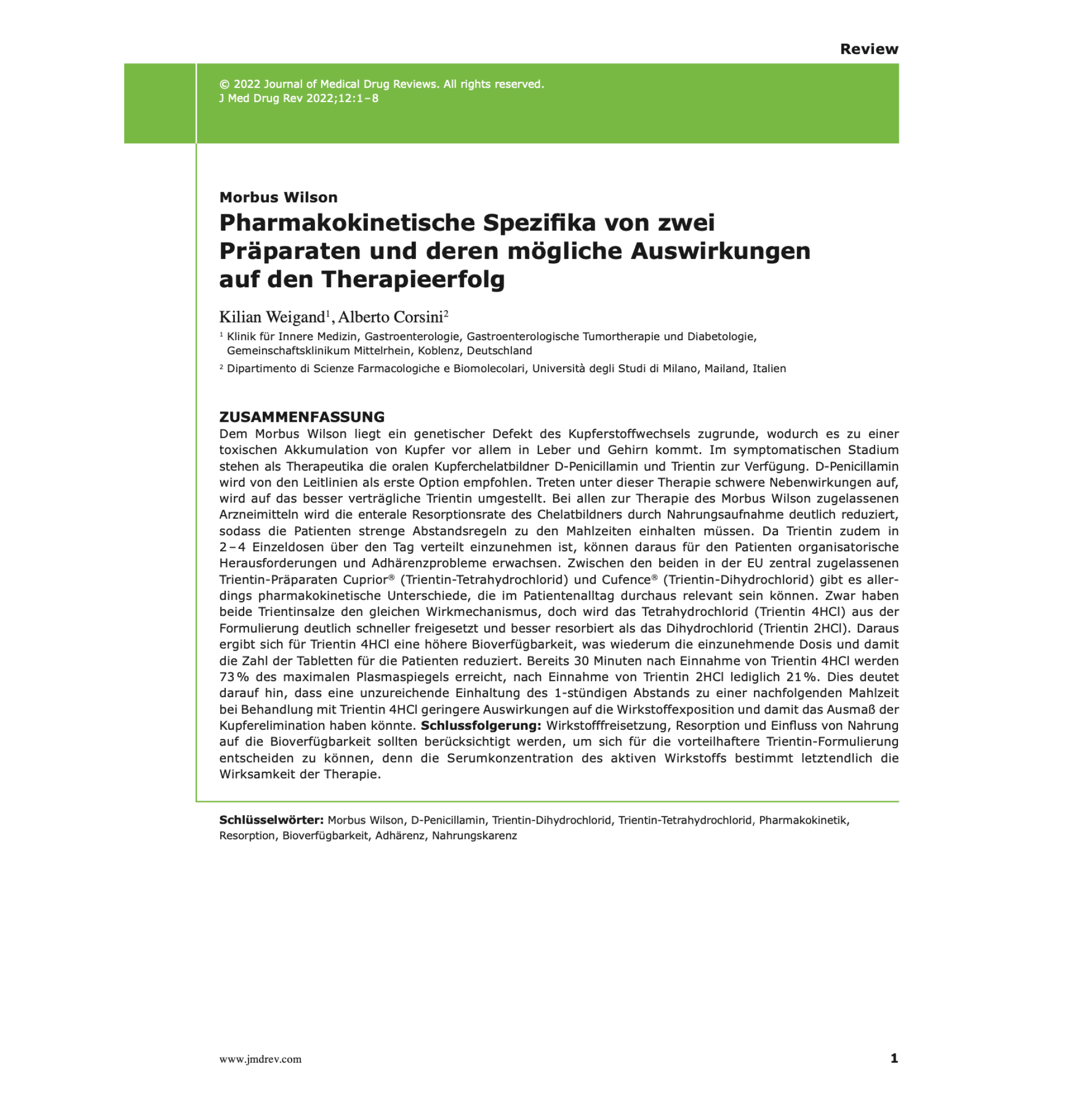Brentuximab Vedotin in der Behandlung maligner Lymphome
J Med Drug Rev 2014;4:37–51
Brentuximab Vedotin (BV) ist ein neuartiges Antikörper-Wirkstoff-Konjugat (antibody drug conjugate, ADC). Es setzt sich aus dem monoklonalen Anti-CD30-Antikörper cAC10 und dem Zytostatikum Monomethyl-Auristatin E (MMAE, Vedotin), einem Inhibitor der Tubulinpolymerisation, zusammen, wobei der Anti-CD30-Antikörper mittels eines Linkermoleküls mit dem Zytostatikum verbunden ist. Die Substanz zeichnet sich durch eine hohe Spezifität des Antikörpers sowie eine hohe Stabilität der Toxinbindung am Linkermolekül aus. Erst nach Internalisierung des Konjugats in die Tumorzelle wird MMAE enzymatisch vom Antikörper abgespalten und freigesetzt. Dadurch wird eine zielgerichtete („targeted“) Therapie CD30-positiver hämatologischer Neoplasien mit hohem Wirkungsgrad und günstigem Nebenwirkungsprofil ermöglicht.
BV erwies sich in zwei Phase-II-Studien bei den CD30-positiven Tumorentitäten Hodgkin-Lymphom (Morbus Hodgkin, MH) und anaplastisches großzelliges Non-Hodgkin-Lymphom (ALCL) in rezidivierten bzw. refraktären Patientenpopulationen als wirksam und gut verträglich. In der Studie SG035-0003 bei 102 MH-Patienten nach autologer Stammzelltransplantation betrug die objektive Ansprechrate 75 %, darunter 34 % vollständige Remissionen. Das Ein-Jahres-Überleben wurde mit 89 % angegeben, das geschätzte 3-Jahres-Überleben betrug 54 %. In der Studie SG035-0004 bei 58 ALCL-Patienten wurde eine Ansprechrate von 86 %, darunter 57 % vollständige Remissionen, berichtet. In dieser Studie betrug das Ein-Jahres-Überleben 70 %, das geschätzte 3-Jahres-Überleben 63 %.
Auf Basis dieser beiden Studien wurde BV sowohl in den USA als auch der EU (EMA-Zulassung Oktober 2012) für die Behandlung des rezidivierten und refraktären CD30-positiven MH und ALCL zugelassen. Die Substanz wird derzeit auch in früheren Stadien dieser Erkrankungen in Kombination mit Standardchemotherapien und in Form einer Monotherapie sowie bei weiteren CD30-positiven Lymphom-Entitäten untersucht.
Brentuximab Vedotin in the treatment or malignant lymphomas
Brentuximab vedotin (BV) is a novel antibody-drug conjugate (ADC). It consists of the anti-CD30 monoclonal antibody cAC10,which is conjugated with the cytotoxic agent monomethyl auristatin E (MMAE, vedotin), a tubulin polymerization inhibitor. In BV, the anti-CD30 antibody is covalently attached to the cytotoxic agent by a linker molecule. The agent is characterized by a high specificity of the monoclonal antibody and a high stability of toxin binding to the linker molecule. Only upon internalization of the conjugate by tumour cells MMAE is enzymatically cleaved from the antibody and subsequently released. This enables a targeted therapy of CD30-positive haematological malignancies with a high rate of efficacy and a favourable safety profile. Two phase II studies have proven the efficacy and safety of brentuximab vedotinfor the treatment of the CD30-positive tumour entities Hodgkin’s lymphoma (Hodgkin’s disease) and anaplastic large cell non-Hodgkin’slymphoma (ALCL)in patient populations with relapsed or refractory disease. In the SG035-0003 trial, enrolling 102 patients with Hodgkin’s lymphoma following autologous stem cell transplantation, the objective response rate was 75%, including 34% complete remissions. The 1-year survival rate amounted to 89%, the estimated 3-year survival rate to 54%. In the SG035-0004 trial, in which 58 ALCL patients were assessed, a response rate of 86% was reported, including 57% complete remissions. In this study, 1-year survival was 70%, the estimated 3-year survival 63%.
Based on these two trials, BV was approved for the treatment of relapsed and refractory CD30-positive Hodgkin’s lymphoma and ALCL in the USA and the EU (EMA approval in October 2012). The substance is currently being investigated for the treatment of earlier stages of these diseases, in combination with standard chemotherapy or as monotherapy as well as for the treatment of further CD30-positive lymphoma entities.
Brentuximab Vedotin (BV) ist ein neuartiges Antikörper-Wirkstoff-Konjugat (antibody drug conjugate, ADC). Es setzt sich aus dem monoklonalen Anti-CD30-Antikörper cAC10 und dem Zytostatikum Monomethyl-Auristatin E (MMAE, Vedotin), einem Inhibitor der Tubulinpolymerisation, zusammen, wobei der Anti-CD30-Antikörper mittels eines Linkermoleküls mit dem Zytostatikum verbunden ist. Die Substanz zeichnet sich durch eine hohe Spezifität des Antikörpers sowie eine hohe Stabilität der Toxinbindung am Linkermolekül aus. Erst nach Internalisierung des Konjugats in die Tumorzelle wird MMAE enzymatisch vom Antikörper abgespalten und freigesetzt. Dadurch wird eine zielgerichtete („targeted“) Therapie CD30-positiver hämatologischer Neoplasien mit hohem Wirkungsgrad und günstigem Nebenwirkungsprofil ermöglicht.
BV erwies sich in zwei Phase-II-Studien bei den CD30-positiven Tumorentitäten Hodgkin-Lymphom (Morbus Hodgkin, MH) und anaplastisches großzelliges Non-Hodgkin-Lymphom (ALCL) in rezidivierten bzw. refraktären Patientenpopulationen als wirksam und gut verträglich. In der Studie SG035-0003 bei 102 MH-Patienten nach autologer Stammzelltransplantation betrug die objektive Ansprechrate 75 %, darunter 34 % vollständige Remissionen. Das Ein-Jahres-Überleben wurde mit 89 % angegeben, das geschätzte 3-Jahres-Überleben betrug 54 %. In der Studie SG035-0004 bei 58 ALCL-Patienten wurde eine Ansprechrate von 86 %, darunter 57 % vollständige Remissionen, berichtet. In dieser Studie betrug das Ein-Jahres-Überleben 70 %, das geschätzte 3-Jahres-Überleben 63 %.
Auf Basis dieser beiden Studien wurde BV sowohl in den USA als auch der EU (EMA-Zulassung Oktober 2012) für die Behandlung des rezidivierten und refraktären CD30-positiven MH und ALCL zugelassen. Die Substanz wird derzeit auch in früheren Stadien dieser Erkrankungen in Kombination mit Standardchemotherapien und in Form einer Monotherapie sowie bei weiteren CD30-positiven Lymphom-Entitäten untersucht.
Brentuximab Vedotin in the treatment or malignant lymphomas
Brentuximab vedotin (BV) is a novel antibody-drug conjugate (ADC). It consists of the anti-CD30 monoclonal antibody cAC10,which is conjugated with the cytotoxic agent monomethyl auristatin E (MMAE, vedotin), a tubulin polymerization inhibitor. In BV, the anti-CD30 antibody is covalently attached to the cytotoxic agent by a linker molecule. The agent is characterized by a high specificity of the monoclonal antibody and a high stability of toxin binding to the linker molecule. Only upon internalization of the conjugate by tumour cells MMAE is enzymatically cleaved from the antibody and subsequently released. This enables a targeted therapy of CD30-positive haematological malignancies with a high rate of efficacy and a favourable safety profile. Two phase II studies have proven the efficacy and safety of brentuximab vedotinfor the treatment of the CD30-positive tumour entities Hodgkin’s lymphoma (Hodgkin’s disease) and anaplastic large cell non-Hodgkin’slymphoma (ALCL)in patient populations with relapsed or refractory disease. In the SG035-0003 trial, enrolling 102 patients with Hodgkin’s lymphoma following autologous stem cell transplantation, the objective response rate was 75%, including 34% complete remissions. The 1-year survival rate amounted to 89%, the estimated 3-year survival rate to 54%. In the SG035-0004 trial, in which 58 ALCL patients were assessed, a response rate of 86% was reported, including 57% complete remissions. In this study, 1-year survival was 70%, the estimated 3-year survival 63%.
Based on these two trials, BV was approved for the treatment of relapsed and refractory CD30-positive Hodgkin’s lymphoma and ALCL in the USA and the EU (EMA approval in October 2012). The substance is currently being investigated for the treatment of earlier stages of these diseases, in combination with standard chemotherapy or as monotherapy as well as for the treatment of further CD30-positive lymphoma entities.




